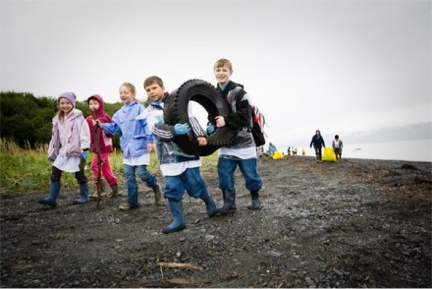Since November of 1984, volunteers have been walking Kachemak Bay beaches, trash bags and clipboards in hand, with two goals in mind: clean up the beaches and monitor shore life and human activities. Now in its 30th year, the Center for Alaskan Coastal Studies’ CoastWalk has become a fall ritual for many who annually return to beaches they’ve adopted to track.
Last Thursday, CoastWalk began with a kick off celebration at Alaska USA Federal Credit Union. Under the theme “Healthy Kachemak, Healthy You,” this year CoastWalks focuses on the relationship between clean water and clean oceans and our health. New for this year is the Clean Kachemak Challenge. Businesses and organizations are invited to sponsor clean ups of beaches or to sponsor the CACS marine debris art program, as Alaska USA did.
“We’re challenging businesses and organizations to get involved,” said Loretta Brown, CoastWalk coordinator.
CoastWalk began with discussions among the China Poot Bay Society board members, the environmental education organization that became the Center for Alaskan Coastal Studies. Homer had been divided about a debate to buy back oil and gas leases in Kachemak Bay, said Michael McBride, one of the founders of the China Poot Bay Society. The group wanted a way to bring Homer together.
“I thought the community could come together around its young people and its passion for the bay,” he said.
His idea was to get people to adopt a section of beach, cleaning it up and monitoring changes yearly. CoastWalk now covers 32 sections of beaches from Anchor Point to Nanwalek. Volunteers log information like observations of birds and animals, marine life, kinds of seaweed and human activities.
“The idea was it would be an annual snapshot of the bay,” Brown said. “It would be something we could look back on and compare.”
Anne Wieland has monitored the beaches near her Neptune Bay cabin since the 1980s. She said she’s seen more otters and fewer invertebrates, but also increased erosion from a shift in the outflow of the Woznesenki River.
This year volunteers are asked to look for sea star wasting disease, lesions that appear on sea star rays. The CoastWalk packet includes information on the disease and precautions to keep it from spreading, Brown said.
McBride said in the early years he tried to bring some prestige to CoastWalk by inviting volunteers to his family’s Kachemak Bay Wilderness Lodge and walking the local beaches. One year former Gov. Wally Hickel came.
“I thought, well, if people saw Wally Hickel coming down to Homer, Alaska, maybe I should do it?” McBride said.
The focus on early CoastWalks was cleaning up some problem beach areas like along Kachemak Drive, where people had dumped old cars. An old clam digger machine on the Spit eventually got removed. Data collection was more important, though, McBride said, and it became valuable when in March 1989 the Exxon Valdez spilled at least 11 million barrels of oil into Prince William Sound. The first Exxon Valdez oil that hit Homer was spotted by a CoastWalk volunteer, McBride said.
With school groups and groups working in organized community clean-ups, volunteers have kept Kachemak Bay beaches clear of local trash and marine debris that washes up here. CoastWalk also is now coordinated with the International Coastal Cleanup projects done worldwide in September, and uses the ICC data sheets. The cleanliness of bay beaches impresses him, McBride said. McBride said he recently walked the McKeon Spit beach and was impressed at how little garbage was there.
“Our beaches in Kachemak Bay are in beautiful shape,” he said. “I was astounded and how clean it is and how proud I am of the CoastWalkers.”
Despite its success, McBride said CoastWalk should be seen in the larger context of the world’s oceans and climate.
“The real function of CoastWalk is to get people engaged in the larger discussion. CoastWalk is lovely, but it’s only like changing your lightbulbs in the face of climate change,” he said. “CoastWalk is a key piece of this process. You’re not going to get people engaged culturally, politically, with the school system unless they get beyond the minutae.”
Michael Armstrong can be reached at michael.armstrong@homernews.com.
Coastwalk: 30 years of monitoring beaches


